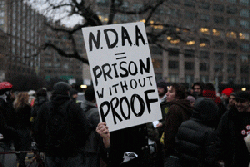Congressman Dennis Kucinich (D-OH) is urging Members of Congress to reject H.R. 4310, the National Defense Authorization Act, FY 2013 because it prepares the way for a disastrous war with Iran. He is right. Even if the House accepts a proposed amendment by John Conyers (D-MI) to state that the authorization is not a specific declaration of war, the bill still calls for aggressive redeployment of our armed services to begin “credible, visible preparations for a military option.”
On the House Floor this week Kucinich said:
“To start the war in Iraq, Congress was lied to.
“To start the war in Afghanistan, Congress was misled.
“To start the war in Libya, Congress was ignored.
“To start the war in Iran, language has been hidden in the NDAA.
“The NDAA prepares for war against Iran. It has a declaration of policy which includes military action. It has a plan to pre-position aircraft, munitions and fuel for air and sea-based missions. It has a plan for maintaining sufficient naval assets in the region to launch a sustained sea and air campaign against a range of Iranian nuclear and military targets. This bill prepares for war…. (E)ven if it’s amended, it prepares for war and we need to vote the bill down because it prepares for war with Iran which would be devastating to this country’s interest.”
The White House has threatened to veto the bill, but not for the right reasons. The administration has identified more than 30 separate problems with the measure, which was authored by the House Armed Services Committee and would set military spending levels for 2013. Chief among them is the fact that the $642 billion measure exceeds the amount the House agreed to in the Budget Control Act just last summer by $8 billion. House Republicans intend to offset that extra spending by cutting programs that aid the poor.
But the administration issued its veto threat over just two provisions.
The first is that the bill includes restrictions that “would impinge on the President’s ability to implement the New START Treaty and to set U.S. nuclear weapons policy,” the White House said, referring to the treaty that limits U.S. and Russian nuclear weapons stockpiles.
Secondly, the bill places a slew of restrictions on how the administration can handle detainees from the war on terror and changes the way in which it can jail and transport suspects, including enemies captured on the battlefield and held on naval vessels.
In other words, it’s a power struggle over who can get to war most quickly. Few are concerned about the devastating effects a war with Iran would cause for the United States, not to mention those in the region.
It’s relevant to note here that last year’s NDAA is still being fought by those opposed to a portion of the law giving the government wide powers to regulate the detention, interrogation and prosecution of suspected terrorists, saying it left journalists, scholars and political activists facing the prospect of indefinite detention for exercising First Amendment rights.
U.S. District Judge Katherine Forrest in Manhattan said this week in a written ruling that the law challenged the Constitutionally-protected right of free speech and due process for Americans and encouraged Congress to change it. Americans suspected of ties to terrorism could be indefinitely detained under the law.
Activists cited the ruling as a success. But the judicial process will go on. It is our responsibility to speak up and speak out against these travesties of justice.
After all, evil flourishes when good men do nothing.






Leave a Reply